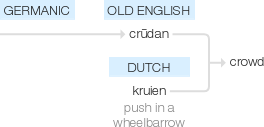Crowd
Old English crūdan ‘press, hasten’, of Germanic origin; related to Dutch kruien ‘push in a wheelbarrow’. In Middle English the senses ‘move by pushing’ and ‘push one's way’ arose, leading to the sense ‘congregate’, and hence (mid 16th century) to the noun.
wiktionary
From Middle English crouden, from Old English crūdan, from Proto-Germanic *krūdaną, *kreudaną. Cognate with Dutch kruien.
Inherited from Middle English crowde, from Welsh crwth or a Celtic cognate.
etymonline
crowd (v.)
Old English crudan "to press, crush." Cognate with Middle Dutch cruden, Dutch kruijen "to press, push," Middle High German kroten "to press, oppress," Norwegian kryda "to crowd." Related: Crowded; crowding.
crowd (n.)
1560s, "large group of persons, multitude," from crowd (v.). The earlier word was press (n.). Crowd (n.) was used earlier in the now-archaic sense of "act of pressing or shoving" (c. 1300). From 1650s as "any group or company of persons contemplated in a mass." Crowd-pleaser is by 1924; crowd-control is by 1915; crowd-surf (v.) is by 1995; crowdsourcing (n.) is from 2006.
